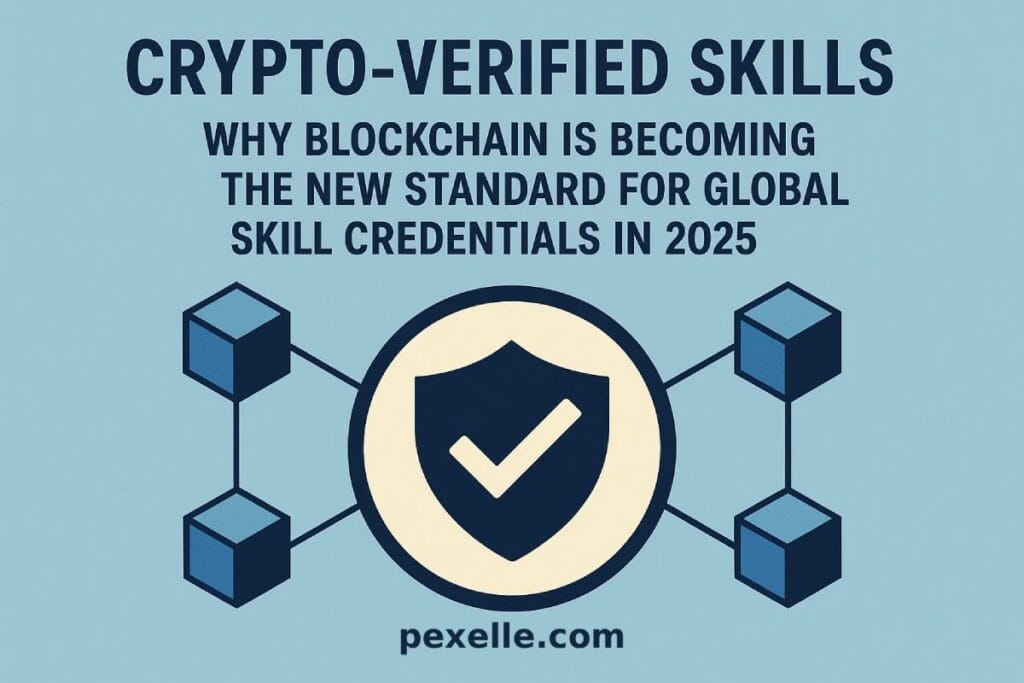Crypto-Verified Skills: Why Blockchain Is Becoming the New Standard for Global Skill Credentials in 2025

Why traditional degrees fail, and how on-chain skill verification is redefining trust, mobility, and talent identity
1. The Trust Crisis: Why Traditional Degrees No Longer Work
For decades, degrees and certificates were the backbone of hiring.
But in 2025, companies face a brutal reality:
- diplomas can be forged
- course certificates can be purchased
- bootcamp badges are easily inflated
- AI can fabricate entire portfolios
- résumé fraud is at its highest level in history
Worse, degrees fail to capture:
- real skill levels
- practical competency
- micro-skills
- recency of practice
- proof of applied work
Traditional credentials prove attendance, not ability.
Hiring teams know this HR surveys in 2025 show that over 45% of résumés contain unverifiable information.
The trust model is broken.
A new infrastructure is needed.
2. Enter Crypto-Verified Skills: The Next Evolution of Credentialing
Crypto-Verified Skills place human capability on a tamper-proof blockchain ledger, creating a new standard for:
- verification
- authenticity
- provenance
- global portability
When a skill, project, or competency is written to the blockchain:
- it can’t be edited
- it can’t be forged
- it can’t be deleted
- it can be verified instantly by any employer in the world
This removes the biggest weakness of traditional credentials: trusting the applicant.
3. Why Blockchain Solves the Credential Fraud Problem
Credential fraud thrives because records live in:
- PDF files
- easily edited images
- unreliable institutional databases
- unverifiable email attachments
Blockchain introduces:
✔ Immutable Proof
No one can alter or fake a credential once it’s on-chain.
Not even the issuing institution.
✔ Transparency
Employers can verify any entry without contacting a third party.
✔ Global Access
A person changing countries or employers no longer depends on local institutions.
✔ Permissionless Verification
No need for universities or training centers to respond or cooperate.
✔ De-centralized Trust
The credential’s truth is not dependent on any single authority.
This is the future companies are betting on.
4. Skill Credentialing vs. Academic Credentialing
Academic degrees represent:
- 3–4 years of mixed learning
- broad subjects
- outdated syllabi
- no measurement of real application
Skill credentials represent:
- precise micro-skills
- real performance
- project-based evidence
- up-to-date competency
- skill graph relationships
- real-world relevance
And when placed on-chain, they become:
- portable
- trustable
- auditable
- globally interoperable
Degrees show schooling.
On-chain skills show capability.
5. Why Crypto-Verified Skills Are Becoming the Global Standard in 2025
Three global forces pushed the world toward this transformation:
A) Remote Global Hiring
Companies now hire from 100+ countries.
They cannot contact every university or training bootcamp.
They need trustless credentialing.
B) Rise of Autonomous Hiring Systems
AI recruiters need structured, verifiable data not self-reported claims.
On-chain skills are machine-readable and extremely reliable.
C) Mobility of Workforce
Workers now change:
- countries
- industries
- roles
- employers
…far more than before.
A portable, global skill identity is essential.
6. What Crypto-Verified Skills Actually Look Like
Every entry includes:
- skill definition
- evidence sources
- issuer identity
- timestamp
- cryptographic signature
- optional project metadata
- verification link
Examples:
✔ On-chain proof that someone completed a real project
(not just finished a course)
✔ On-chain proof of micro-skills
(e.g., model fine-tuning, React component design, cloud deployment)
✔ On-chain proof of performance
(score, evaluation, difficulty level)
This gives employers truth, not claims.
7. Why Employers Prefer On-Chain Skill Credentials
Companies trust crypto-verified skills because they provide:
- Instant verification
- Impossible-to-forge proofs
- Real evidence
- Global consistency
- Machine-readable format
- Structured skill taxonomy
- Protection against résumé fraud
Hiring becomes:
- faster
- fairer
- lower-risk
- data-driven
8. How Pexelle Implements Crypto-Verified Skills
Pexelle is built from the ground up around Skill Provenance, and blockchain is the natural extension.
Here’s how Pexelle enables on-chain credentialing:
✔ 1. Evidence-Based Skill Graphs
Every skill is connected to:
- micro-skill events
- real projects
- AI evaluations
- timestamps
This becomes the “source of truth” for on-chain writing.
✔ 2. On-Chain Attestation Layer
Pexelle writes the cryptographic fingerprint of skills to blockchain networks.
This proves:
- authenticity
- ownership
- timestamp integrity
- issuer reliability
✔ 3. Portable Talent Identity
A user can take their Pexelle Skill Identity anywhere in the world:
- employers
- platforms
- countries
- job ecosystems
- AI matching systems
No institution can block or erase it.
✔ 4. API for Instant External Verification
Employers or platforms can verify skills instantly via:
- blockchain explorer
- Pexelle verification API
- employment systems
- applicant tracking systems
This makes hiring seamless.
9. Why On-Chain Skills Reduce Inequality
Traditional systems disadvantage:
- immigrants
- self-taught talent
- career switchers
- freelancers
- junior developers
- people without formal degrees
On-chain skill credentials empower these groups by allowing them to prove:
- real ability
- real work
- real contributions
not their educational background.
This is the most meritocratic credential model ever created.
10. The Future: A Global Skill Identity System
By 2030:
- every skill will have a verification layer
- résumés will be replaced by skill graphs
- blockchain records will be standard in HR
- talent identity will be portable
- hiring AI will rely exclusively on verifiable skills
Pexelle is building the infrastructure for this world.
11. Conclusion: Blockchain Makes Skills Trustable Again
The world no longer trusts words on a résumé.
It trusts verifiable skills backed by cryptographic proof.
Degrees prove education.
On-chain skills prove capability.
This is why Crypto-Verified Skills are becoming the global standard
and why Pexelle is leading that transformation.
Source : Medium.com




